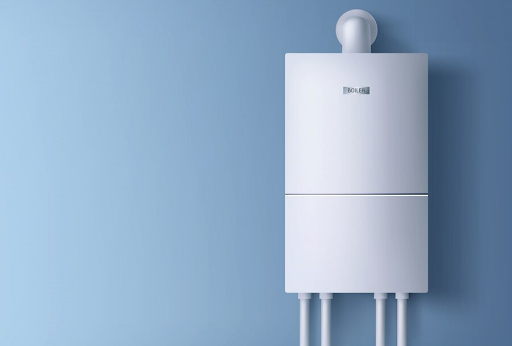Choosing between an electric and gas water heater can impact your energy bills, efficiency, and overall convenience. Each type has its benefits and drawbacks, making the right choice depending on your needs.
This guide breaks down the pros and cons of both electric and gas water heaters, helping you determine which option is best for your home.
Pros and Cons of Electric vs. Gas Water Heaters
Choosing the right water heater means weighing the advantages and drawbacks of both electric and gas models. So, before moving to the comparison of specific aspects, let’s highlight the general pros and cons of each.
Pros of Electric Water Heaters
Electric water heaters have several benefits, making them a convenient choice for many households.
-
Higher energy efficiency – Nearly all the electricity used is converted into heat, minimizing waste.
-
Lower installation costs – No need for gas lines or ventilation systems, reducing upfront expenses.
-
Flexible placement – Can be installed in smaller spaces due to the lack of venting requirements.
-
Safer operation – No combustion process, eliminating risks of gas leaks or carbon monoxide poisoning.
-
Low maintenance – Fewer parts mean less upkeep compared to gas models.
-
Longer lifespan – Typically lasts 10–15 years with proper maintenance.
Cons of Electric Water Heaters
Despite their benefits, electric models have some limitations that may not suit every home.
-
Higher electricity costs.
-
Slower heating time.
-
Limited efficiency for large households.
-
No hot water during power outages.
Pros of Gas Water Heaters
Gas-powered water heaters provide a powerful and cost-effective solution, especially for homes with high water usage.
-
Lower operating costs – Natural gas is usually cheaper than electricity in most areas.
-
Faster heating and recovery time – Heats water more quickly, making it ideal for large families.
-
Better performance for high demand – Can handle multiple users at the same time.
-
Works during power outages – As long as a gas supply is available, it continues to function.
-
More effective for large capacity tanks – Gas models heat big tanks more efficiently than electric ones.
Cons of Gas Water Heaters
While gas heaters are powerful, they come with some downsides that may influence your decision.
-
Higher installation costs.
-
More maintenance is required.
-
Safety risks.
Electric Vs. Gas Water Heaters Comparison
As far as we briefly outline the main pros and cons, let’s compare these in a few key areas, including capacity, maintenance, and energy efficiency.
Efficiency vs. Cost Comparison
The choice between an electric or gas water heater often comes down to efficiency and long-term costs. Electric models tend to be more energy-efficient because they convert almost all the energy into heat, whereas gas heaters lose some energy through venting. However, electricity rates are usually higher than natural gas, making overall costs a key consideration.
-
Electric Water Heaters
-
Higher energy efficiency with minimal energy loss
-
Typically, lower upfront costs but higher monthly energy expenses
-
Gas Water Heaters
-
Lower operational costs due to cheaper natural gas prices
-
Some heat is lost through venting, reducing efficiency
Operating Costs
Long-term expenses play a crucial role in choosing a water heater. While electric units have lower initial costs, they can be more expensive to run in areas with high electricity rates. Despite their higher upfront investment, gas heaters often provide savings over time due to lower fuel costs.
-
Electric Water Heaters
-
Higher electricity rates can lead to increased energy bills
-
No pilot light means no continuous gas usage
-
Gas Water Heaters
-
Generally lower cost per unit of energy compared to electricity
-
Some models require a continuously burning pilot light, adding to energy costs
Performance & Capacity
Performance is key when considering a household’s hot water demand. Gas water heaters generally heat water faster and are better suited for larger families, while electric models work well for smaller households or those with lower water usage.
-
Electric Water Heaters
Heats water more slowly but maintains temperature well -
Suitable for smaller homes or limited hot water needs
-
Gas Water Heaters
-
Heats water quickly, making it ideal for high-demand households
-
Can provide hot water even during power outages
Recovery Rate
Recovery rate refers to how quickly a water heater can replenish hot water after use. Gas heaters outperform electric models in this area, making them preferable for households with higher water consumption.
-
Electric Water Heaters
-
Slower recovery rate, requiring longer wait times for reheating
-
Works efficiently for homes with lower simultaneous water use
-
Gas Water Heaters
-
Faster recovery rate, ensuring a steady supply of hot water
-
Suitable for homes with multiple people using hot water at the same time
Capacity Options
Both gas and electric water heaters come in different sizes, but their heating mechanisms influence their efficiency at varying capacities. Choosing the right size depends on your household’s daily hot water needs.
-
Electric Water Heaters
-
Available in a wide range of tank sizes, including compact models
-
Tankless options exist but are generally less powerful than gas versions
-
Gas Water Heaters
-
More effective for larger capacity tanks due to faster heating times
-
Tankless gas models provide nearly endless hot water on demand
Installation
Installation costs and complexity differ between electric and gas water heaters. Electric models are generally easier and cheaper, while gas units require proper ventilation and additional safety considerations.
-
Electric Water Heaters
-
Simple and affordable installation with no venting required
-
Can be placed in a variety of locations due to compact design
-
Gas Water Heaters
-
Requires ventilation for safe operation, increasing installation costs
-
May need additional piping if a gas line is not already in place
Maintenance and Lifespan
Proper maintenance extends the life of a water heater. While both types require upkeep, gas models typically need more frequent servicing due to combustion-related components.
-
Electric Water Heaters
-
Requires minimal maintenance, mainly flushing the tank periodically
-
Longer lifespan (10–15 years) due to fewer moving parts
-
Gas Water Heaters
-
Needs regular maintenance, including checking the burner and ventilation
-
Slightly shorter lifespan (8–12 years) due to exposure to combustion byproducts
Environmental Impact
Energy consumption and emissions differ significantly between electric and gas water heaters. While electric models are more efficient, their environmental footprint depends on the energy source used for electricity generation.
-
Electric Water Heaters
-
No direct emissions, making them more eco-friendly if powered by renewable energy
-
Higher energy efficiency but may rely on fossil-fuel-based electricity in some areas.
-
Gas Water Heaters
-
Carbon emissions from natural gas combustion can be more eco-friendly than electric models in regions with coal-based electricity.
Get the Best Heaters at Voomi
By weighing these factors, you can determine which water heater best suits your needs based on energy efficiency, long-term costs, and household demands. However, no matter which type you decide to proceed with, we are here to help you out. At Voomi Supply, you will find a wide selection of high-quality heaters and replacement parts. Browse online or visit us to get professional assistance in choosing the best heater for your home.


